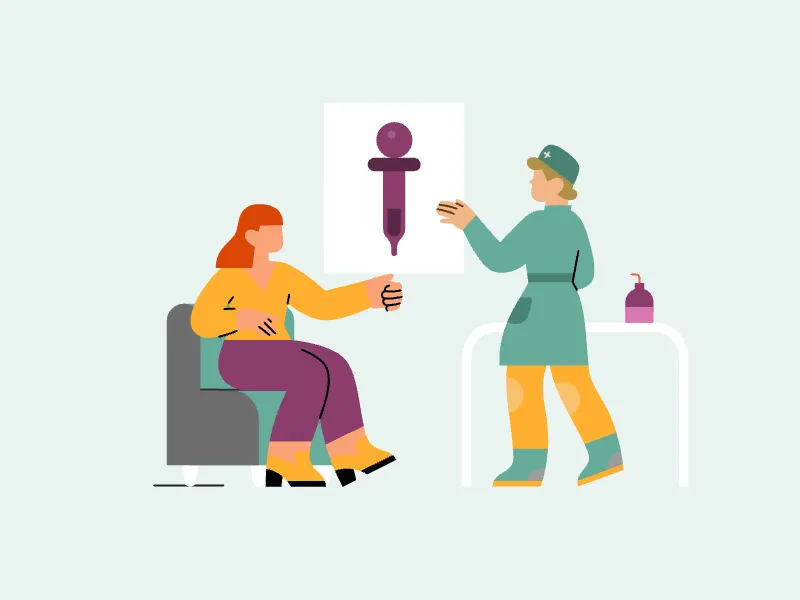Physical signs of anorexia
Anorexia nervosa is a mental health disorder, but the low body weight and disordered eating habits that accompany the condition often lead to a number of physical symptoms.
Physical signs of anorexia can be especially dangerous, so if you're noticing these issues in yourself or a loved one, it's important to seek out help.
Heart health complications
Cardiovascular issues are some of the most common signs of anorexia—and some of the most dangerous.
A slower-than-normal heart rate (bradycardia) is especially common, occurring in nearly 95% of patients with AN. Anorexia nervosa can also cause structural changes, including a decrease in heart ventricle size.
1Fluid build-up in the space around the heart occurs in up to 71% of patients, making it another of the most common physical signs of anorexia. And, at their most dangerous, the cardiovascular complications of anorexia nervosa can lead to cardiac arrest.
1 Lack of menses
One of the most prominent signs of an eating disorder in females—whether AN or other eating disorders—is an impact on the menstrual cycle.
Amenorrhea, or the consistent lack of menses, was long considered one of the cardinal signs of anorexia in women.2 The issue is connected to several symptoms of anorexia, including:
2 - Low body weight
- A decrease in body fat
- Excessive exercise that some people with AN partake in
Still, other, more biological factors continue to be studied, including the impact AN has on the endocrine system, which regulates hormones, including those involved in the menstrual cycle.
2 Hair loss
Healthy hair growth is significantly linked to a healthy and nutritious diet. As such, the tendency to severely limit food intake in those with anorexia nervosa can lead to hair loss, brittle and dry hair, or other hair damage.
3Specifically, the lack of zinc, iron, and selenium has been tied to hair loss, though hair health can improve once these minerals are reintroduced to the body.
3 Nutrition counseling may be able to help someone with AN improve their diet and combat this sign of anorexia.
Gastrointestinal discomfort
Despite involving a restriction of food, anorexia nervosa can have a profound impact on the gastrointestinal tract.
Heartburn, difficulty swallowing, non-cardiac chest pain, and the sensation of a lump in the throat (globus) are common anorexia signs affecting the esophagus. Those with purging type AN, who sometimes experience self-induced vomiting as part of their condition, were found to be particularly at risk for these issues.
4Anorexia nervosa has also been connected to slow gastric emptying, which can lead to unpleasant side effects like nausea, vomiting, and feeling over-full.
4 These issues were particularly prevalent for AN patients in the refeeding stage of recovery.
4Nearly half of AN patients in one study reported struggling with some type of gastrointestinal disorder, including defecatory disorders and
irritable bowel syndrome.
4 Bone health issues
Like cardiovascular complications, bone health issues are among the most common signs of anorexia.
Low bone mineral density is prevalent, appearing in up to 50% of adolescent girls with anorexia and as many as 70% of adolescent boys with the condition in one study.5 The group was also found to have impaired bone architecture, which is among the risk factors for more easily breaking or fracturing bones.5
Bone health is also a concern for older anorexia nervosa patients. Nearly all adult AN patients had osteopenia, or low bone density, in one study, with 38% also experiencing osteoporosis, one of the most prominent signs of anorexia.5
{{link-bank-two-column}}
Mental and emotional anorexia signs
Weight loss and a fear of gaining weight may result in many physical signs of anorexia, but the condition is, at its core, a mental health disorder. As such, there are several emotional and behavioral signs of anorexia nervosa.
These traits tend to maintain the condition and can bring on a relapse even in cases when someone reaches a healthy weight, so it's crucial to incorporate a mental health professional when treating anorexia nervosa.
Preoccupation with food, eating, and body image
A preoccupation with food, eating, and body image aren't just signs of anorexia; they're core aspects of the condition itself.
This often looks like an intense fear of gaining weight or consistent behavior that interferes with weight gain.6 In day-to-day life, someone may express these anorexia signs by:
7- Fixating on certain foods or ingredients
- Eliminating certain foods or entire food groups from their diet
- Developing strange or strict rituals around food and eating
People with AN also frequently have a
distorted body image—a sense of self-worth that's connected heavily to body shape or weight—and the inability or refusal to acknowledge the danger of their low body weight.
6Body image concerns can present as regularly comparing one's body to others or commenting on the size, shape, or weight of other peoples' bodies. They can also lead to frequent checks in the mirror or avoiding the mirror altogether and wearing oversized clothes to hide their body shape.
7 Low self-esteem
Connected to a sense of self-worth that's derived primarily from body weight and shape is
chronically low self-esteem.
This issue has long been tied to eating disorders of all types, and low self-esteem was considered in at least one seminal study to be a prerequisite for the development of any eating disorder. However, there's still some debate about whether eating disorders drive low self-esteem or vice-versa.
8In the case of someone struggling with AN, low self-esteem can present as social isolation or withdrawal, constant comments about feeling "fat" or other self-disparaging remarks, or trouble expressing emotion, among other
anorexia signs.
7 Life-threatening signs of anorexia nervosa
While many signs of anorexia can be uncomfortable, some can be life-threatening if left untreated. Blood pressure issues, electrolyte abnormalities, irregular heartbeat, and other cardiac problems, in particular, are the most life-threatening.10
Mental health complications of AN can also prove deadly. Sadly, suicide is the second leading cause of death for patients with anorexia nervosa. And as many as one-third of people with AN have at least considered suicide, according to one study on the subject.11
All told the risk of death from anorexia nervosa is about 12 times higher than those in the general population and 12 times higher than the death rate of all causes of death for females aged 15 to 24.12 This is why it's so important to seek out help as soon as possible.
Finding help for anorexia nervosa
Anorexia nervosa is a dangerous mental health condition. While understanding the signs of anorexia is a crucial aspect of understanding the disorder, it's essential for someone struggling with AN to seek appropriate care.
Remote treatment that works
At Within Health, we strive to offer that help. Our team of multidisciplinary experts can help patients work through both the mental and physical signs of anorexia, developing individual treatment plans that are suited to each patient's specific history and current needs.
The entire program can be followed from home through our website and app, with food and medical equipment delivered right to your door.
Get help today Remember: It's never too late to reach out for help. Often, it's the first—and most important—step on the road to recovery.





































